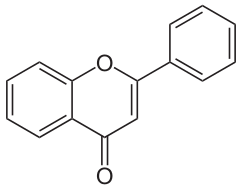In continuation of my update on Flvonoids

Previous research has shown that the plant-produced chemicals known as flavonoids have beneficial antioxidant and anti-inflammatory properties. Anthocyanins, the type of flavonoid investigated in the current study, have been detected in lung tissue shortly after being ingested, and in animals models of chronic obstructive pulmonary disease (COPD). The plant chemicals appear to reduce mucus and inflammatory secretions.
However, "the epidemiological evidence on the association between flavonoids and lung function is very scant," said lead study author Vanessa Garcia-Larsen, Ph.D., assistant professor in the Human Nutrition Division of the Department of International Health at the Johns Hopkins Bloomberg School of Public Health in Baltimore, Maryland. "So we wanted to investigate whether dietary intake and anthocyanins are associated with lung function decline in middle-age adults."
The researchers analyzed data from 463 adults (average age: 44) who participated in the second and third European Community Respiratory Health Surveys from 2002 to 2012. Those included in the current study completed a dietary questionnaire and underwent spirometry at enrollment and upon follow-up. A common lung function test, spirometry measures the amount of air that a person can forcefully exhale in one second (FEV1), the total amount of air a person can exhale after taking a deep breath (FVC) and the ratio of the two, FEV1/FVC. Participants were then grouped into quartiles based on the amount of anthocyanins they consumed.
The study found individuals in the highest, compared to the lowest, quartile of anthocyanin intake had:
- a slower rate of annual decline in FEV1 than those in the lowest quartile: -9.8 milliliters per year (mL/yr) vs. -18.9 mL/yr.
- a slower rate of annual decline in FVC than those in the lowest quartile: -9.8 mL/yr vs. -22.2 mL/yr.
- a slower rate of annual decline in FEV1/FVC: -0.02/yr.
The researchers also analyzed the association between anthocyanin consumption and lung function in smokers, those who had never smoked and those who quit. The association between high consumption of the flavonoids and reduced lung function decline appeared to be stronger among both never smokers and those who had quit than in the general study population. Among smokers, the study did not find an association between anthocyanin intake and lung function.
The study adjusted for a wide range of factors, including characteristics of participants' diets, gender, height, body mass index and socioeconomic status. Another strength of the study was its inclusion of participants from two countries, Norway and England. The study was limited by its relatively small size and the fact that diets were self-reported.
"Our study suggests that the general population could benefit from consuming more fruits rich in these flavonoids like berries, particularly those who have given up smoking or have never smoked, Dr. Larsen said. "For smokers, quitting remains the best thing they can do to protect their health."
The first European Community Respiratory Health Survey began in 1990 in response to a worldwide increase in asthma prevalence. The scope of the surveys has expanded to include information about the associations between behavioral and environmental factors that might also affect the development of COPD.







